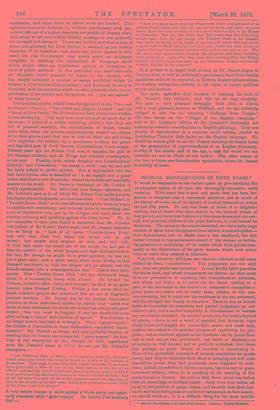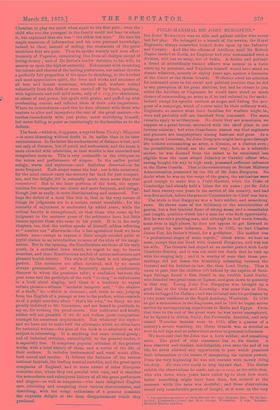MUSICAL RECOLLECTIONS OF FIFTY YEARS.* Ir would be impossible in
our limited space to give anything like an adequate notice of all that this thoroughly exhaustive work contains. With much that is new, and much that has been for- gotten, it comprises also a connected narrative, not so much of the history of music, as of the history of musical transactions within the last fifty years. To any real lover of music it is delightful reading, but to those who have shared in the musical events of that period, and have been habitues of the opera-house and concert- hall, and punctual visitors at the great festivals, it must indeed be charming. The actors in the scenes described, or—for a sadly large number of these have disappeared from earthly scenes altogether— their descendants, will no doubt have a less unalloyed, but still keener interest in this permanent record of the success or failure, the greatness or mediocrity, of the works which their genius com- posed, or the illustrations of the great masters which with either voice or touch they essayed to illustrate.
Very few, however, will have new wounds inflicted or old sores rubbed by these "recollections." The judgments are not only just, they are gentle and generous. A most kindly spirit pervades the whole book, and where comparisons are drawn—as they must be in the prosecution of anything like comprehensive criticism, and where one object is to point out the finest reading of a part, or the one truest to the author's or composer's conception— great pains are taken not to make them odious, or the cen- sure sweeping, but to point out the weakness in the one preferred, and the strength and beauty in the other. There is, too, an honest desire to reconsider his premature and partial judgments on our author's part, and a modest simplicity in his readiness to confess any over-hasty mistakes. In another point, too, his book is beyond all praise,—there is not a word of scandal, that favourite topic where actors and singers are concerned ; music, and music only, inspires our author in his genuine purpose of registering its pro- gress ; not an anecdote against moral character can be found from end to end, except one performer's sad habit of drinking,—a propensity so well known, and so publicly exhibited, that there was perhaps no great breach of courtesy in mentioning it. Even of the proverbial jealousies of musical notabilities he speaks rarely, and only to illustrate their effect in bringing out still more marvellous power than had previously been supposed to exist. Once, indeed, he refers to it for its own sake, but it is only in good- humoured raillery, when he is speaking of the carrying of the opera troupe to Vienna. He tells us that there never was before such an assemblage of brilliant talent ; there were nine ladies, all equal to the position of prima donna, and he adds that their hus- bands and their distinguished conductor had enough on their hands ; we should think so ; it is a difficult thing for the moat humble * Misdeal Recollections of the Lad Stilt-Century. London: Tinsley Brothers.
Christian to play the ninth when equal to the first part ; even the child who was the youngest in the family could not bear to admit it, but explained that she was " the eldest but nine." He uses his ample resources of information and his own personal knowledge, indeed, to clear, instead of soiling, the characters of the great musicians that are gone. Thus he speaks warmly and even affec- tionately of Paganini, exonerating him from all charges except of loving money; and of De Beriot's tender devotion to his wife, he assures us upon the highest authority. Not content with recording the talents and charms of the leading performers, our author devotes a perfectly fair proportion of his space to sketching, in the kindest and most appreciative spirit, the lives and works and successes of all true and honest musicians, whether such workers retired voluntarily from the field or were carried off by death, speaking, with legitimate and still mild scorn, only of a very few charlatans, or others of real power, but spoilt with praise, and puffed up with overbearing conceit and inflated ideas of their own importance. Where he remonstrates—and this he does oftenest with those who venture to alter and interpolate the text of the great masters—he soothes immediately with just praise, never stultifying himself, but never failing to point as convincingly to the beauties as to the defects.
The book—which is, it appears, a reprint from Tinsley's Magazine —is more charming without doubt in its earlier than in its later reminiscences. In the latter the enchantment of distance is lost, and not only of distance, but of youth and enthusiasm, and the scene is more crowded with celebrities, so that wonder is less exercised and comparison more so. This is very noticeable in the critiques on the voices and performance of singers. In the earlier period eulogy, warm and rapturous—and doubtless deserved—is far more frequent. Each singer seems the best ; nor is this unnatural, for the mind cannot carry the memory far back for just compari- son, and the delight felt is naturally much more acute than that remembered. But in the later portions of the book, the oppor- tunities for comparison are closer and more frequent, and eulogy, though just as ready, is more discriminating and measured. Per- haps the defect of a book like this is, that in the very nature of things its judgments are to a certain extent unreliable ; for the intensity of enjoyment is moderated by added years, while the critical faculty is strengthened, so that those who come up for judgment in the maturer years of the arbitrator have but little chance against those who came in his youth. It is in the early chapters, too, that the author speaks of himself, seldom referring to " number one" afterwards—for a less egotistical book we have seldom seen—except to express a little simple-minded pride or joyful elation in an introduction to some of the idols of his imagi- nation. But in the opening, the Recollections are those of his early youth, in a cathedral town which, we regret to say, he leaves nameless, and these Recollections are full of artless enthusiasm and pleasant boyish history. The style of the book is not altogether perfect. The sentences are often involved, and by no means always grammatical, and we frequently cannot satisfactorily discover to whom the pronouns refer ; a confusion between the past tense and the participle of the verb " to sing " is unfortunate in a book about singing, and there is a tendency to repeat certain phrases—witness "laudator temporis acti," "the shadow of a shade," &c.—which is tiresome ; and, truth to say, judging from the English of a passage or two in the preface, which reminds us of a pulpit anecdote about " that's his own," we fancy we are greatly indebted to Mr. Gruneisen, and are bound in gratitude to say so, for revising the proof-sheets. Our cultivated and kindly author will not grumble if we do not reckon prose composition amongst his numerous acquirements. But whatever the style— and we have not to make half the allowance which we often have for technical writers—the plan of the book is as admirable as the subject is interesting. It is anything but mere musical gossip ; and of technical criticism, unintelligible to the general reader, it is especially free. It comprises popular criticism of the greatest works, with a brief history of them, and a notice of the life of their authors. It includes instrumental and vocal music alike, both sacred and secular. It follows the fortunes of the various national festivals, the leading musical societies, and the great opera companies of England, and to some extent of other European countries also, where they run parallel with ours, and it sketches the antecedents and subsequent history of all the great performers and singers—as well as composers—who have delighted English ears, criticising and comparing their various characteristics, and describing, with the wrapt enthusiasm of a genuine musician the exquisite delight or the deep disappointment which they produced.



































 Previous page
Previous page